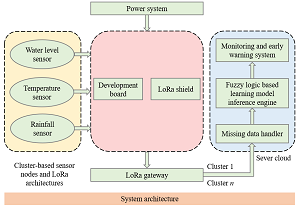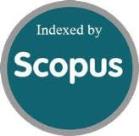Enhancing River Flood Prediction in Early Warning Systems Using Fuzzy Logic-Based Learning
DOI:
https://doi.org/10.46604/ijeti.2024.13426Keywords:
flood prediction, flood prevention, flood situation awareness, fuzzy logic-based learningAbstract
Previous studies show that the fuzzy-based approach predicts incoming floods better than machine learning (ML). However, with numerous observation points, difficulties in manually determining fuzzy rules and membership values increase. This research proposes a novel fuzzy logic-based learning (FLBL) that embeds missing data imputations and a fuzzy rule optimization strategy to enhance ML performance while still benefiting from fuzzy theory. The simple moving average handles sensors’ missing data. The logical mapping is used for fuzzification automation and fuzzy rule generation. The join function between the Szymkiewicz–Simpson coefficient similarity and max function is applied to optimize a fuzzy rules model. The case study uses observation data from three rivers traversing three districts in Semarang City. As a result, FLBL achieves 97.87% accuracy in predicting flood, outperforming the decision tree (96%) and the neural network (73.07%). This work is significant as a part of preventive flood-related disaster plans.
References
R. B. Mudashiru, N. Sabtu, I. Abustan, and W. Balogun, “Flood Hazard Mapping Methods: A Review,” Journal of Hydrology, vol. 603, part A, article no. 126846, December 2021.
A. Lamers, S. Devi. S, M. Sharma, R. Berg, J. M. Gálvez, Z. Yu, et al., “Forecasting Tropical Cyclone Rainfall and Flooding Hazards and Impacts,” Tropical Cyclone Research and Review, vol. 12, no. 2, pp. 100-112, June 2023.
M. S. S. Sayyad, P. Surve, N. Shaikh, M. Gharat, and P. Tambe, “IoT Based Early Flood Detection and Avoidance,” Iconic Research and Engineering Journals, vol. 3, no. 12, pp. 50–55, June 2020.
K. Vinothini and S. Jayanthy, “IoT Based Flood Detection and Notification System Using Decision Tree Algorithm,” International Conference on Intelligent Computing and Control Systems, pp. 1481-1486, May 2019.
M. I. Zakaria, W. A. Jabbar, and N. Sulaiman, “Development of a Smart Sensing Unit for LoRaWAN-Based IoT Flood Monitoring and Warning System in Catchment Areas,” Internet of Things and Cyber-Physical Systems, vol. 3, pp. 249-261, 2023.
A. Radhika, G. Manochitra, K. Keerthanen, K. Mahendran, R. M. Kumar, and N. M. Sarath, “Low Cost IoT Based Early Detection of Flood Monitoring and Alert System Using GPS and GSM,” AIP Conference Proceedings, vol. 2527, no. 1, October 2022.
K. Malek, E. Ortiz-Rodriguez, Y. C. Lee, J. Murillo, A. Mohammadkhorasani, L. Vigil, et al., “Design and Implementation of Sustainable Solar Energy Harvesting for Low-Cost Remote Sensors Equipped with Real-Time Monitoring Systems,” Journal of Infrastructure Intelligence and Resilience, vol. 2, no. 3, article no. 100051, September 2023.
A. I. Silverman, T. Brain, B. Branco, P. sai venkat Challagonda, P. Choi, R. Fischman, et al., “Making Waves: Uses of Real-Time, Hyperlocal Flood Sensor Data for Emergency Management, Resiliency Planning, and Flood Impact Mitigation,” Water Research, vol. 220, article no. 118648, July 2022.
Y. Liu, X. K. Wang, W. H. Hou, H. Liu, and J. Q. Wang, “A Novel Hybrid Model Combining a Fuzzy Inference System and a Deep Learning Method for Short-Term Traffic Flow Prediction,” Knowledge-Based Systems, vol. 255, article no. 109760, November 2022.
H. M. Lyu, Z. Y. Yin, A. Zhou, and S. L. Shen, “MCDM-Based Flood Risk Assessment of Metro Systems in Smart City Development: A Review,” Environmental Impact Assessment Review, vol. 101, article no. 107154, July 2023.
R. Costache, M. C. Popa, D. T. Bui, D. C. Diaconu, N. Ciubotaru, G. Minea, et al., “Spatial Predicting of Flood Potential Areas Using Novel Hybridizations of Fuzzy Decision-Making, Bivariate Statistics, and Machine Learning,” Journal of Hydrology, vol. 585, article no. 124808, June 2020.
E. Šarak, M. Dobrojević, and S. A. Sedmak, “IoT Based Early Warning System for Torrential Floods,” FME Transactions, vol. 48, no. 3, pp. 511-515, 2020.
M. Anbarasan, B. Muthu, C. B. Sivaparthipan, R. Sundarasekar, S. Kadry, S. Krishnamoorthy, et al., “Detection of Flood Disaster System Based on IoT, Big Data and Convolutional Deep Neural Network,” Computer Communications, vol. 150, pp. 150-157, January 2020.
S. I. Abdullahi, M. H. Habaebi, and N. Abd Malik, “Intelligent Flood Disaster Warning on the Fly: Developing IoT-Based Management Platform and Using 2-Class Neural Network to Predict Flood Status,” Bulletin of Electrical Engineering and Informatics, vol. 8, no. 2, pp. 706-717, June 2019.
A. K. Lohani, N. K. Goel, and K. K. S. Bhatia, “Improving Real Time Flood Forecasting Using Fuzzy Inference System,” Journal of Hydrology, vol. 509, pp. 25-41, February 2014.
A. Rostami, M. Akhoondzadeh, and M. Amani, “A Fuzzy-Based Flood Warning System Using 19-Year Remote Sensing Time Series Data in the Google Earth Engine Cloud Platform,” Advances in Space Research, vol. 70, no. 5, pp. 1406-1428, September 2022.
A. W. Jayawardena, E. D. P. Perera, B. Zhu, J. D. Amarasekara, and V. Vereivalu, “A Comparative Study of Fuzzy Logic Systems Approach for River Discharge Prediction,” Journal of Hydrology, vol. 514, pp. 85-101, June 2014.
G. Wee, L. C. Chang, F. J. Chang, and M. Z. M. Amin, “A Flood Impact-Based Forecasting System by Fuzzy Inference Techniques,” Journal of Hydrology, vol. 625, part. B, article no. 130117, October 2023.
S. Supatmi, R. Hou, and I. D. Sumitra, “Study of Hybrid Neurofuzzy Inference System for Forecasting Flood Event Vulnerability in Indonesia,” Computational Intelligence and Neuroscience, vol. 2019, no. 1, article no. 6203510, 2019.
B. Agbo, H. Al-Aqrabi, R. Hill, and T. Alsboui, “Missing Data Imputation in the Internet of Things Sensor Networks,” Future Internet, vol. 14, no. 5, article no. 143, May 2022.
Q. Shao, A. Aldhafeeri, S. Qiu, and S. Khuder, “A Multiplicative Holt–Winters Model and Autoregressive Moving-Average for Hyponatremia Mortality Rates,” Healthcare Analytics, vol. 4, article no. 100262, December 2023.
C. K. Leung, J. D. Elias, S. M. Minuk, A. R. R. de Jesus, and A. Cuzzocrea, “An Innovative Fuzzy Logic-Based Machine Learning Algorithm for Supporting Predictive Analytics on Big Transportation Data,” IEEE International Conference on Fuzzy Systems (FUZZ-IEEE), pp. 1-8, July 2020.
Y. Bai and X. Lu, “Multiple Kernel Learning-Based Rule Reduction Method for Fuzzy Modeling,” Fuzzy Sets and Systems, vol. 465, article no. 108534, August 2023.
J. Ringo, S. Sabai, and A. Mahenge, “Performance of Early Warning Systems in Mitigating Flood Effects. A Review,” Journal of African Earth Sciences, vol. 210, article no. 105134, February 2024.
M. Siddique, T. Ahmed, and M. S. Husain, “Flood Monitoring and Early Warning Systems – An IoT Based Perspective,” EAI Endorsed Transactions on Internet of Things, vol. 9, no. 2, article no. e4, 2023.
H. Z. Tedla, T. W. Bekele, L. Nigussie, E. D. Negash, C. L. Walsh, G. O’Donnell, et al., “Threshold-Based Flood Early Warning in an Urbanizing Catchment Through Multi-Source Data Integration: Satellite and Citizen Science Contribution,” Journal of Hydrology, vol. 635, article no. 131076, May 2024.
E. Gambini, A. Ceppi, G. Ravazzani, M. Mancini, I. Q. Valsecchi, A. Cucchi, et al., “An Empirical Rainfall Threshold Approach for the Civil Protection Flood Warning System on the Milan Urban Area,” Journal of Hydrology, vol. 628, article no. 130513, January 2024.
C. Prakash, A. Barthwal, and D. Acharya, “FLOODALERT: An Internet of Things Based Real-Time Flash Flood Tracking and Prediction System,” Multimedia Tools and Applications, vol. 82, no. 28, pp. 43701-43727, November 2023.

Published
How to Cite
Issue
Section
License
Copyright (c) 2024 Rinta Kridalukmana, Dania Eridani, Risma Septiana, Ike Pertiwi Windasari

This work is licensed under a Creative Commons Attribution-NonCommercial 4.0 International License.
Copyright Notice
Submission of a manuscript implies: that the work described has not been published before that it is not under consideration for publication elsewhere; that if and when the manuscript is accepted for publication. Authors can retain copyright in their articles with no restrictions. Also, author can post the final, peer-reviewed manuscript version (postprint) to any repository or website.

Since Jan. 01, 2019, IJETI will publish new articles with Creative Commons Attribution Non-Commercial License, under Creative Commons Attribution Non-Commercial 4.0 International (CC BY-NC 4.0) License.
The Creative Commons Attribution Non-Commercial (CC-BY-NC) License permits use, distribution and reproduction in any medium, provided the original work is properly cited and is not used for commercial purposes.







.jpg)


